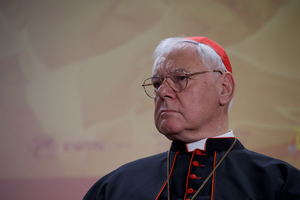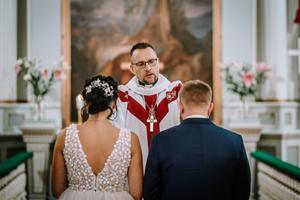After the Death of Its Grand Master, Tensions Resurface in the Order of Malta
ANALYSIS: The recent death of Fra’ Giacomo Dalla Torre del Tempio di Sanguinetto has reignited internal discussion on the way forward.

ROME — The death last month of the Order of Malta’s grand master, Fra’ Giacomo Dalla Torre del Tempio di Sanguinetto, has sparked internal discussion over who could succeed him, while at the same time reigniting intrigues and painful tensions between those pushing to modernize the order and others who believe in its traditional character.
Dalla Torre, a kindly and highly cultured librarian who did much for the poor and came from a noble family in Treviso, died at 12:08am on April 29, according to official records. He served three years to the day as head of the ancient chivalric order that was founded at the time of the Crusades but has evolved into one of the Catholic Church’s largest humanitarian organizations.
The grand master had been ill for some time, with terminal cancer of the throat, and his medical condition had worsened after making an official trip in January to Benin, where the order provides extensive medical care.
When Dalla Torre was elected in 2017, he was the leading Italian member of the order and took over the helm at a time of widening internal rifts. Fra’ Matthew Festing, Dalla Torre’s predecessor, had been forced to resign after he dismissed the order’s grand chancellor, Albrecht Freiherr von Boeselager, for insubordination over his role — which Boeselager disputed — in the distribution of hundreds of thousands of contraceptives by the order’s humanitarian arm, Malteser International; Boeselager then appealed to the Vatican and was reinstated.
But underlying these tensions was a wing, headed by Boeselager and primarily made up of German members, who had been pushing for various changes to the rules, including those that currently guarantee that the grand master and at least five out of 10 places on the Sovereign Council (the order’s executive board) be reserved for professed knights of the order (those who take religious vows of poverty, chastity and obedience). The reformers wanted, and continue to want, to allow non-professed knights to fill those positions.
Those favoring these traditions of the order — who comprise most of the professed — resisted such proposals, which they viewed as going against its traditional character and turning it into a quasi-nongovernmental organization. These tensions persisted during Dalla Torre’s tenure, but little progress was made on the part of those pushing for change, despite Pope Francis and his special delegate to the order, Cardinal Angelo Becciu, seeming to favor such reform.
For a number of years, sources within the order say that Boeselager has wanted to hold an extraordinary general chapter to implement the reforms by updating the order’s constitution and code. Convoking such a meeting is something only a grand master can do, but Dalla Torre had allegedly not confirmed a date before he was admitted to the Ars Medica clinic in Rome three days before his passing. The order announced soon after his death a decree, dated April 28, summoning the order’s members to the extraordinary chapter in November, but it was not clear when it was signed.
This led to suspicions that reformers had changed Dalla Torre’s time of death to make it seem as though his ultimate act was to convoke the meeting dedicated to reform. These suspicions were based on conflicting reports regarding the exact date and time of Dalla Torre’s death, deriving from rumors that the grand master’s brother, Giuseppe, had visited the clinic to pay his last respects to Dalla Torre on April 28. An email was also sent to German association members by its president, Prince Erich von Lobkovicz, at 2:14pm on April 28, stating: “From Rome we hear that our dear Grand Master, Fra’ Giacomo dalla Torre, died in Rome today.” He added: “In November a large requiem is planned before the general chapter.”
This email, which the Register has seen, was recalled about an hour later, and it wasn’t until the early hours of the following morning that the order issued an official statement announcing Dalla Torre had died, shortly after midnight on April 29, and with a doctor’s certificate to prove it. The Register asked von Lobkowicz why he sent the initial email and then recalled it, but he did not respond.
However, Dalla Torre’s brother Giuseppe, a former head of the Vatican judiciary, said he visited his brother every day “morning and afternoon” before he died. “I can assure that on the 28th he was alive,” he told the Register May 20. “Any statement to the contrary is unfounded.”
The news circulating on the morning of April 28 that the grand master had died “was obviously false,” Order of Malta spokesman Eugenio Ajroldi di Robbiate told the Register May 15. Ajroldi added that, following the rumors that Dalla Torre had died on April 28, that day the order’s Grand Magistry issued a press release at 4pm saying the grand master had been admitted to the clinic “in a serious condition.” He died “shortly after midnight on April 29, according to the death certificate drawn up by the doctors treating him,” Ajroldi said.
Asked when exactly Dalla Torre signed the decree convoking the extraordinary general chapter, Ajroldi said: “The decision to convoke the extraordinary general chapter was taken by the Grand Master and the Sovereign Council at their meeting on April 2,” and the “letter of convocation was signed by the Grand Master at the Magistral Palace the week before his death.” He stressed that the order’s staff had been “smart working” due to the coronavirus since the middle of March, and “for this reason, many of the activities have inevitably slowed down.”
Sensitive Issues
Even if the concerns regarding a possible manipulation of the time of death are unfounded, the suspicions point to the sensitivities surrounding the general chapter meeting, especially for the professed members of the order who feel they are being overpowered by the faction led by Boeselager.
The professed have already privately expressed concerns that they will not see a draft of the reform proposals until the last minute, and therefore be unable to resist any of the modernizing efforts, which intend also to include reducing the authority of the professed and increasing the powers of the order’s non-professed members. But this was played down by Ajroldi, who said the professed will “obviously” be shown the draft.
“The professed and all the participants in the extraordinary general chapter — which will have the task of discussing and approving the changes to the current Constitutional Charter and Code of the Sovereign Order of Malta — will receive a copy of the draft well in advance,” he said. He added that it will be given to them “well before the weeks preceding the extraordinary general chapter, as soon as the draft is ready and after consultation with the Holy See on matters concerning canon law.”
The more immediate issue is the election of a new grand master. According to the order’s constitution, the election is supposed to take place no more than three months after a grand master’s death.
Various names are being suggested, but as the head of the order has to be a professed nobleman through the paternal line rather than the order’s more numerous knights of grace and devotion (non-professed), the pool of candidates is relatively small, and many are very elderly. This was one of the rules the reforms were expected to change: perhaps expanding possible candidates to include knights of grace and devotion, but this never happened, and so the old rule remains in place.
Also due to what some senior members of the order say was the oppressive force of some German members, the order has very few professed because of various changes, including a practice developed recently of accepting only elderly widowers. Some of them do not have the required degree of nobility in their family to become grand master, and a good number are simply not able to take on such a mandate because of age or infirmity.
One of the candidates reportedly favored by the reform faction is Fra’ Marco Luzzago, 70, an Italian chief justice from Brescia who insiders say would collaborate with those pushing for change. Other candidates are Fra’ Ludwig von Call, an 86-year-old Tyrolean and former professor of chemistry in Innsbruck, and Fra’ Karel Paar, also 86 and grand prior emeritus of Bohemia.
The younger professed potential candidates are said to be more able, but they lack certain requirements. One is Fra’ Emmanuel Rousseau, a devout professed Frenchman, but he does not have the required noble bloodline to be the grand master. A second is Fra’ Nicolò Custoza de’ Catani, who has the required nobility and considered by many to be an excellent candidate, but he has only been professed for four years.
Matthew Festing is also considered a potential candidate. Many in the order believe that Festing’s resignation was invalid, as he was forced to resign even though the position, like that of a pope, is generally meant to be for life. Also, the Holy See disregarded its own 1953 decree, which placed clear limits on how much the Vatican could intervene in the order’s sovereign status.
Although in relatively poor health, if reinstated as grand master, Festing could name a permanent lieutenant of the order who would carry out duties on his behalf.
Ajroldi said the date for the election has not yet been set because “it is impossible to predict” when the restrictions imposed by the coronavirus on flights will be lifted and when the “movement of people between different countries and continents will be possible again.”
He said in the current situation, the order’s lawyers have confirmed the three-month rule “can be waived,” but that “as soon as health conditions permit,” the interim lieutenant, who is temporarily running the order, “will convene the council of state for the election.”
Edward Pentin is the Register’s Rome correspondent.
- Keywords:
- edward pentin
- order of malta

















